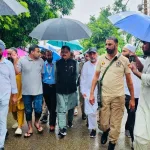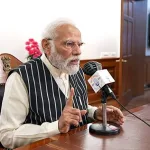For the past three decades, Nighat Shafi Pandith from Srinagar has been on a mission to empower Kashmiri women. She is making efforts to educate, empower and bring back the lost smile of women.
Born and brought up in Gogji Bagh area of Srinagar, after completing her studies, the 71-year-old moved to New Delhi along with her husband who was a government officer.
She came back to Srinagar in 1997 after her mother passed away. Seeing trauma and distress among people in Kashmir she was compelled to stay in valley. In the same year, she started working for people. “It was the most challenging decade in Kashmir history,” Nighat said.
“I stepped out of a comfortable home and started visiting inmates at Srinagar’s lone Psychiatric Hospital where I met with inmates,” she said.
Nighat recalls that there was distress and trauma everywhere. In the same year, she started the Jammu and Kashmir Help Foundation (JKHF) to work on education, women empowerment etc.
“We started setting up a small school in Habak Sanpora, Srinagar. Then, there was no concrete house in the area. After searches, we found one house and requested the owner to provide two rooms on rent for the school,” she said.
Nighat said they started with educating the children. “While we were engaging with the children we became closer to their mothers and families. We learned that women needed help in many ways,” she said.
“After interacting with women, we thought there is a need for initiatives to boost their morale and confidence. After proper counseling and care, they were trained in their interest domains,” Nighat said, adding that her mission was to make them independent.
She said the vocational training center focuses on making women self-reliant, especially those who are victims of violence and have lost the breadwinners of their families.
“From women empowerment programs, education to health care, we started reaching out to people in rural and urban areas,” she said.
Nighat said over the past several years, they have provided the right sets of skills and training to women. “We have established Kashmir art embroidery training centers across the valley and now they are self-employed,” she said.
“We also started the Shehjar skill development and livelihood program in which 150 women were trained and later they generated employment through their skills,” she said.
Nighat said in training and production alone, special training was provided to adolescent girls, and underprivileged ladies in fine artwork, tailoring, sozni, and other handmade works.
“After Srinagar, our focus was Kupwara which was most affected due to the prevailing situation in the 1990s. In early 2000, we set up Shah Anwar Memorial Secondary School in Khumeriyal and HELP Foundation Model School Mawar, in Handwara in 2006,” she said.
Nighat has been supporting children who lost their parents during turmoil across the valley. “There are hundreds of children unable to continue their education due to financial and family constraints. We provided them a helping hand and they too succeeded,” she said.
“Over the past two decades, the foundation has given financial assistance to over 500 orphan girls with no extended family, or destitute young women with no income, for their marriage,” she said.
Nighat said to make women self-sufficient, the foundation also gives out low-interest micro-finance loans to women in the valley.
“After Srinagar, Kupwara districts, we started our operations in Kashmir. Our main focus is education, health, and empowerment of women,” she said.
Nighat was honored with the Jamnalal Bajaj Award in the category of Development and Welfare of Women and Children in 2012. She is appreciated for her work on various platforms.
Nighat said they also started a mental health clinic. “Initially, we organized medical camps to identify those who needed mental health support for widows and young ladies.”
“Setting up Batul Meeras’ in Downtown in 2021 was my dream. It was aimed to provide a space for women and children so that they could sit and discuss various ideas,” she said.
“Our children are not aware of their culture; they live in the virtual world. Due to lack of interest, they have forgotten their heritage and cultural legacy,” she said.
Nighat says Bait-ul-Meeras is an effort to retrieve the artifacts and other items of the bygone era that have faded away from the cultural landscape.
“Over the past year, we have got an overwhelming response from the visitors. They were satisfied for having been able to preserve and protect history,” she said.
Regarding present plans, Nighat said they are still collecting rare objects across the Valley. “Whatever history we find in any part of the Valley, we add to the collection,” she said.
Nighat Pandith on mission to educate, empower women
Leave a Comment Leave a Comment





